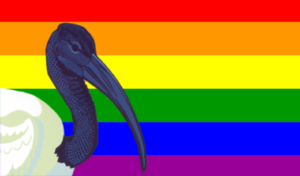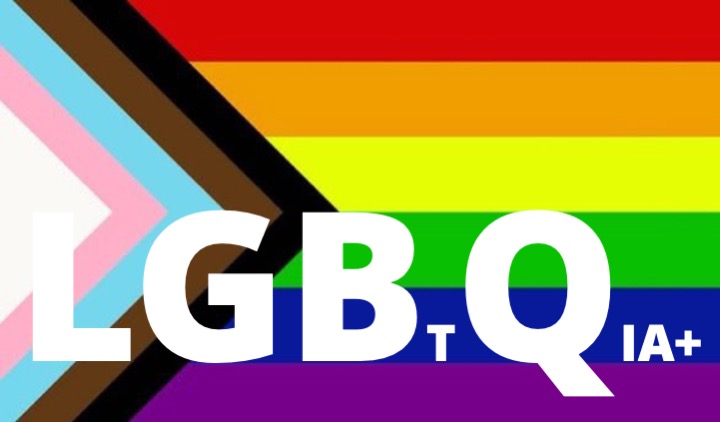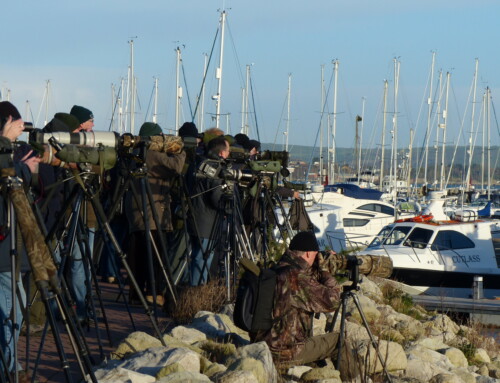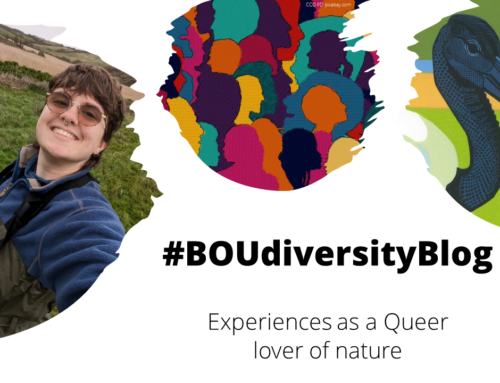 A small chuckle starts deep inside of me and steadily keeps growing. “This is so silly,” I tell myself. Here I am, on my birthday, celebrating another turn of the ol’ calendar, while hanging out with my mom, sister, and my partner having a delightful day seeing just how youthful we still all are at our local indoor trampoline park. I’m standing right on the edge of a tiny 8 ft precipice unable to get my body to take this small leap into a foam ball pit. My laughter at my fear is now so loud and uncontrollable that I have to grab my knees as I double over. This fear is so nonsensical to me. So many people have made this jump over the years. The landing is as soft and welcoming as one could ever desire and my family is there cheering me on. This leap is far smaller than the gigantic jump I took with my family two months before, as I began to openly face a series of figurative precipices that I needed to learn how to negotiate. Now, as I did then, I found myself saying, “Jump. Just jump!”
A small chuckle starts deep inside of me and steadily keeps growing. “This is so silly,” I tell myself. Here I am, on my birthday, celebrating another turn of the ol’ calendar, while hanging out with my mom, sister, and my partner having a delightful day seeing just how youthful we still all are at our local indoor trampoline park. I’m standing right on the edge of a tiny 8 ft precipice unable to get my body to take this small leap into a foam ball pit. My laughter at my fear is now so loud and uncontrollable that I have to grab my knees as I double over. This fear is so nonsensical to me. So many people have made this jump over the years. The landing is as soft and welcoming as one could ever desire and my family is there cheering me on. This leap is far smaller than the gigantic jump I took with my family two months before, as I began to openly face a series of figurative precipices that I needed to learn how to negotiate. Now, as I did then, I found myself saying, “Jump. Just jump!”

Coming to that realisation meant that grad school was an especially trying time for me. I had entered into my first same-sex relationship right before then. I was petrified of people finding out. I was still trying to figure things out myself. Is this who I really am? I kept trying to tell myself that if I really wasn’t, that I could go back to my old life and no one would be any wiser, even though we all know that’s not how that works. I would still be gay, just self-driven deeper into the closet.
So, I lived a double life. Grad school is tough enough when you are open to the world, it can be almost impossible when you feel like you can’t fully be yourself. I struggled throughout my time there and especially near the end when my relationship dissolved. I was devastated. I was left to deal with the heartbreak and who I was all on my own. I didn’t feel like I had anyone with that I could openly discuss the situation. Yes, my campus had some resources at my disposal, but I was still hiding. I’m sure my friends and colleagues would have supported me, as there was no outright negativity regarding LGBTQIA+ from them, but at that time only a few colleagues could be seen sporting pride flags in their offices or on their computers. I wondered if they would look at me the same since I was still struggling to see myself. I just wanted to be Nicole.
I didn’t know how to say just how deeply I was impacted by my “roommate” moving out and pursuing her PhD at an out-of-state institution. I was left searching. Searching for myself and searching for a way to be myself amongst others. I would have benefited from lab, department, scientific society cultures that would have publicly addressed LGBT issues and would have reinforced them throughout my tenure. These organisations could and should have also gone a step beyond and actively celebrated the diversity of the students, faculty, and staff. This would have helped the environment to be more welcoming and to help students and professionals, like me, that are struggling to come out, feel more able to do so. While many institutions are doing better since I left grad school, there is still much work to be done.
In the years following grad school I randomly ran back into my current partner Melissa at a local restaurant in my hometown. We had worked long nights together manufacturing the anthrax vaccine during my time between undergrad and grad school. My eyes were clouded then, as I was trying to figure out who I was and I didn’t realise what was right in front of me. This time, my eyes were finally open and there was no denying the electric chemistry we had. Melissa inspired me to be fully open with my friends and family. To their credit, they were ready for me and I was ready for myself. This culminated when my dad was voted to be the State Commander for the Michigan Department of the American Legion. On stage in front of hundreds of veterans, my dad introduced our family, including Melissa and myself. The warm round of applause the two of us received from a mostly older crowd was a pleasant surprise. My parents were proud to have us up there and I was proud to be making yet another leap in the coming out process. An even better surprise was when my parents shared with us that other veterans then felt inspired to come talk to them in the following weeks and months about being parents of LGBT children.
I was fortunate that my coming out felt like putting on a comfy pair of old jeans. This is how it should be. Unfortunately, this is not the case for everyone. I was and am extremely privileged. My experience came on the back of many other’s sacrifices. I came out in a time of which American society had reached a majority acceptance and now almost 75% of Americans believe homosexuality should be accepted, much better than the 50/50 split it had been from the mid 1990s until 2010 (Pew Research Center, 2020). When Melissa came out to her family ~10 years before me, her experience was quite different and led to much heartache between her and her parents. Thankfully, I can say that over the course of this past decade plus, their opinions have changed and they are the best in-laws I could ever have wished for. Our relationship is fantastic and they are extremely supportive of Melissa and I.
Time and changing attitudes are not the only factors in a smooth coming out. Around the world one is more inclined to accept homosexuality if they are well educated and lean to the left politically (Pew Research Center, 2020). I’m sure if I was to survey my family and friends, while this is not the case with all of them, overall there would be a positive trend for both of those indicators. For those of you in academia, this bodes well, as we all know that academia notoriously skews to the left and the education level of its members is higher than that of society as a whole.
I also came out when there was a much wider representation of LGBT diversity in the media. This helped me to come to terms with who I am. Growing up, all I ever saw in the media were old stereotypes of those who are LGBT. I didn’t see myself in those representations and maybe that is why it took me so long to realise who I am. Right before I came out, multiple people and platforms began to better showcase this diversity. I was able to relate to people like US basketball star Elena Delle Donne and TV shows like Wynonna Earp. In them, I could see myself. Forums like the BOU’s Rainbow Blog are just as important as any celebrity or show for scientific societies and institutions to showcase LGBT members and their work. The LGBT social at #AOSSCO17 showed me that I wasn’t alone with over two dozen LGBT scientists and Allies arriving to share stories and be supportive of each other. While I stayed in the shadows that day, only attending the event as the conference’s social media coordinator, they helped to inspire me to be bold when Melissa and I went on our first date the very next day (that’s right, I am that nerdy that I brought a non-ornithologist to a bird conference for our first date.) The importance of people needing to see manifestations of themselves across all levels of their lives to be comfortable with who they are cannot be understated. Representation matters.
Not to say that as time went on the precipices were always easier for me to negotiate. I was still hesitant to come out to my colleagues. My family and friends love me. Work settings can be more impersonal and have less true concern for your life outside of your employment. As I entered back into the work force after grad school, I was fearful what opportunities would be available to me and what impacts my personal life would have on my work life. Would I be hirable, and would advancement be attainable if others knew about me?
At that time, I was too afraid to take that risk. I was never open with my employers. While all my employers said they would walk the walk of non-discrimination, one would be hard pressed to believe it when the organising body of one of the institutions I worked for openly rejected my life. This made me feel like I had to hide right out in the open and made me not want to fully integrate myself into the community. Institutions cannot claim to be Allies and be connected to organisations that reject LGBTQIA+.

For the upcoming season of Scicomm Monday and for future scicomm I partake in, those mistakes will not be made. I will be more open with who I am and will make sure that future “Nicoles” will have someone they can look to when they are searching for representation. I’ve also started a new initiative called LGBT Scicomm (@LGBTScicomm). This platform will be a place where all LGBTQIA+ scientists and scicommers can tell their stories and share their work.
For all of you facing the potential scary prospect of coming out, take heart. Things get easier. Some of you will still face tough times and the landings might not be that soft, but there are more and more of us out there to help cheer you on and to help support you before, during, and after. For those that want to be an Ally, there are countless ways to give support. Put a pride flag on your office door, attend LGBT socials at conferences, reject discrimination when you come across it, promote LGBT scientists and demand your labs/departments/societies do as well, donate money to LGBTQ causes and events, and most importantly, be there for your family, friends, and colleagues.
So fittingly, here I am almost three years to the day of that leap in the trampoline park, as this article will be published the day before I’ll be blowing out my candles. When I was asked to write this piece, I admit the old fear was there, but as I thought about it that chuckle from deep inside began to immerge again. I’ve made jumps like this before and they have all been soft landings with my family, friends, and colleagues cheering me on. Why turn away from this opportunity now? Why let fear win? To paraphrase a famous movie quote: Am I willing to take a leap of faith or become an old woman filled with regret, waiting to die alone? Once again I tell myself, “Jump. Just jump!”
References
Pew Research Center, June, 2020, The Global Divide on Homosexuality Persists.
If you are interested in contributing to our Rainbow Blogs, please get in touch with us via this form which ensures anonymity for those who seek it.
If you’re a LGBT ornithologist working in the field and want support, then contact the LGBTQ+ Field Network.
If you want to learn more about LGBTQIA+, then Stonewall is a great place to start.




